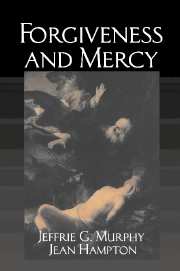Preface and acknowledgments
Published online by Cambridge University Press: 14 January 2010
Summary
This book grew out of conversations and correspondence that we have had since 1985. At that time Murphy sent Hampton a copy of his 1982 essay “Forgiveness and Resentment” (a version of which is included as Chapter 1 of the present book). This prompted her to read, reflect on and write about the issues he had raised. After some initial correspondence and conversations that mixed philosophical topics and life experiences, we realized that we had a deep interest, both intellectual and personal, in the emotions of resentment, hatred and compassion and in the virtues of forgiveness and mercy – virtues that are often regarded as exemplifying the latter emotion and allowing us to overcome the former two. We found these topics important, not only for ethical theory and the theory of virtue, but also for social, political and legal philosophy. Moreover we also found that we both had personal reasons for wanting to subject to philosophical reflection emotions that were important parts of our own personalities and that engaged the religious and moral traditions in which we had been raised.
We early realized that we approached these topics in a sufficiently similar manner that useful exchange between us was possible; but we also realized that each would never bring the other around to a common point of view.
- Type
- Chapter
- Information
- Forgiveness and Mercy , pp. ix - xiiPublisher: Cambridge University PressPrint publication year: 1988



